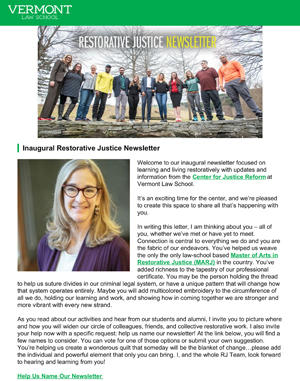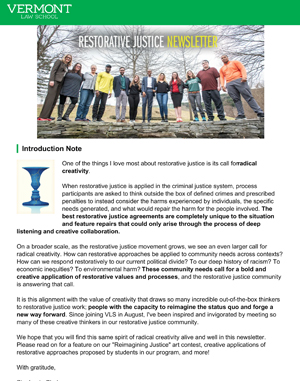The Environmental and Natural Resources Law Clinic (ENRLC) at Vermont Law School today announced a new two-year Toxics Fellowship to provide legal assistance to communities facing toxic pollution problems. The selected fellow will manage the ENRLC's pollution-focused "Partnership for Justice" project while earning a Master of Laws (LLM) in Environmental Law from VLS.
The Partnership for Justice, designed to provide assistance to northern New England communities, is a joint effort between the ENRLC and Toxics Action Center, a nonprofit organization that assists community groups with organization, outreach, media, and strategy development. As part of the project, the ENRLC will provide legal analysis and advice, and may lay the groundwork for litigation.
"We are pleased to collaborate with the Toxics Action Center to help our New England neighbors deal with toxic pollution in their communities," said Professor Ken Rumelt, senior attorney at the ENRLC. "This project reflects our clinic's commitment to environmental justice, and will give the Toxics Fellow a unique opportunity to give back, mentor student clinicians, and hone their legal skills alongside our clinic's senior attorneys."
The deadline for fellowship applications is March 15. To be considered for the fellowship, applicants must hold a juris doctor (JD) degree from an American Bar Association (ABA)-accredited law school. For more information about the Toxics Fellowship, including how to apply, visit the fellowship page online, email admiss@vermontlaw.edu, or call 802-831-1239.
The Environmental and Natural Resources Law Clinic operates as a pro bono public interest law office, providing VLS students with clinical experience to become skilled professionals who can develop arguments and claims from the ground up; explore strategies and options; and communicate effectively with clients, courts, agency officials, scientific experts, and opposing parties. The clinic's work includes a mix of litigation, administrative agency proceedings, client counseling, and other forms of environmental advocacy. ENRLC clients include community groups and conservation organizations, and the clinic partners with a variety of organizations at the local, regional, and national level. ENRLC attorneys and student clinicians represented the Vermont Public Interest Research Group (VPIRG) in its pursuit of a state labeling law for genetically engineered (GE) foods, making national headlines; stopped a new railroad proposed for Montana's Powder River Basin; and are suing the U.S. Fish and Wildlife Service to protect the Canada Lynx in Maine. For more information about the ENRLC, including cases, visit vermontlaw.edu/ENRLC.
###
Vermont Law School, a private, independent institution, is home to the nation's largest and deepest environmental law program. VLS offers a Juris Doctor curriculum that emphasizes public service; three Master's Degrees—Master of Environmental Law and Policy, Master of Energy Regulation and Law, and Master of Food and Agriculture Law and Policy; and four post-JD degrees —LLM in American Legal Studies (for foreign-trained lawyers), LLM in Energy Law, LLM in Environmental Law, and LLM in Food and Agriculture Law. The school features innovative experiential programs and is home to the Environmental Law Center, South Royalton Legal Clinic, Environmental and Natural Resources Law Clinic, Energy Clinic, Food and Agriculture Clinic, and Center for Applied Human Rights. For more information, visit vermontlaw.edu, find us on Facebook, and follow us on Twitter and Instagram.


















